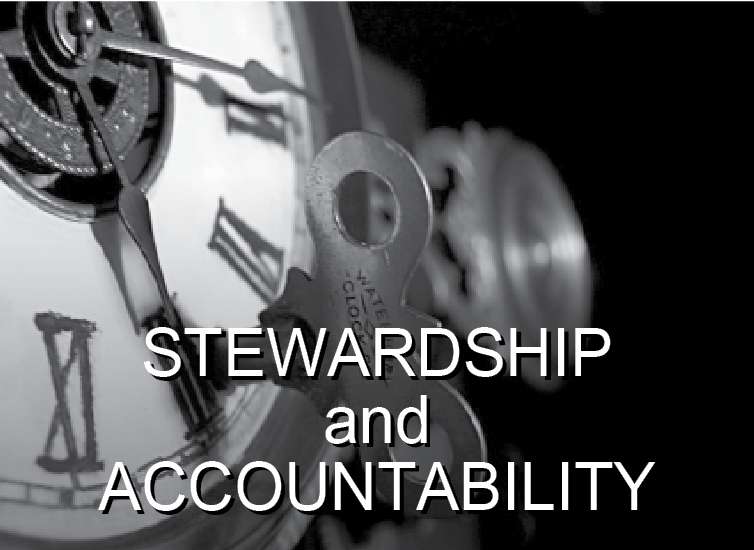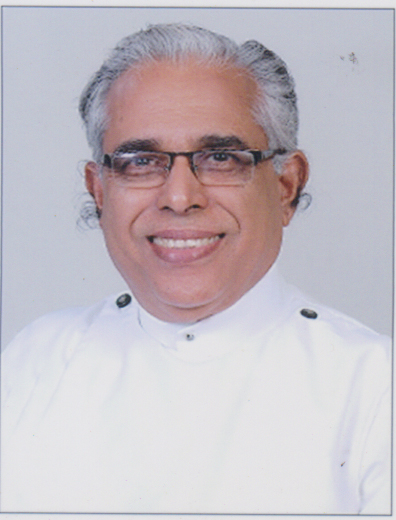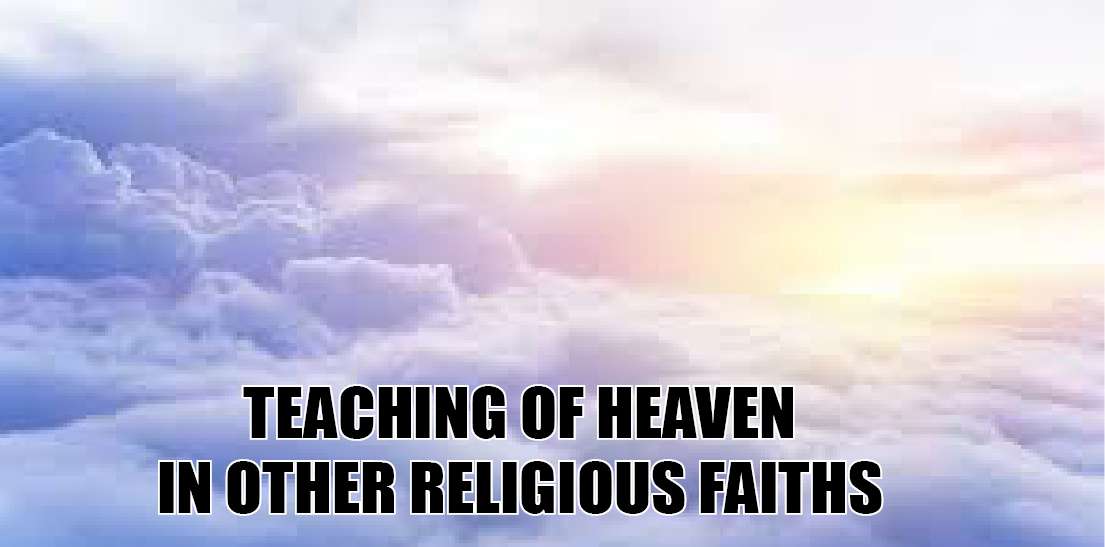

Stewardship and Accountability
Dr. Mathew Varkey
The word for stewardship connotes the idea of house management (Stig = household and weard = keeper). The steward manages, but does not own what he manages; the true owner has a right to an accounting. A steward can misuse, abuse or properly use what has been entrusted to him. Stewardship is an ethic that embodies the responsible planning and management of resources. The concepts of stewardship can be applied to theology, ecology, economics, health, property etc.
Stewardship - A General View
Throughout the Bible, human beings are seen as God’s stewards. God has made everything beautiful and appointed human beings as its faithful stewards. But man misunderstood or misinterpreted the divine command and anointed himself as the pseudo-owner of the cosmos. In the book of Genesis we read that Adam was appointed to dress and keep the garden (Genesis 2:15) The Psalmist sings about the sovereign Lord “The earth belongs to God. Everything in all the world is His. (24:1) While explaining about God’s glory and the greatness of his creatures, the psalmist exclaims “When I look up unto the night skies and see the work of your fingers - the moon and the stars you have made – I cannot understand how you can bother with mere puny man, to pay any attention to him. Yet you have put him in charge of everything you made, everything is put under his authority. O Jehovah, our Lord, the majesty and glory of your name fills the earth (Psalm 8:3ff). The Lord has entrusted the world into our hands to care and protect, and thereby fulfill the divine command.
The Christian understanding of stewardship follows from the belief that human beings are created by the same God who created the entire universe and everything in it. To look after the earth and thus God’s dominion is the responsibility of the Christian steward. In other words, stewardship involves responsible management of our God given resources of time, talents and treasures. Stewards as disciples of Jesus Christ see themselves as mere caretakers of all the gifts of God.
The biblical example of the parable of the tenants clearly poses some pertinent questions (Matthew 21:33ff). What is our responsibility as tenants in the world? What do we owe our master? Do we use our freedom properly? Do we misuse the trust placed in us by our master in our personal life and in our work?
The parable of the two sons found with above mentioned chapter also give us a warning note, regarding the work in the ‘father’s vineyard’ “Son go and work in my vineyard today” (21:28) reminds us of the urgency of mission. Our sonship never allows us to withdraw from our responsibilities as a steward rather it enhances our relationship. The Father commands us to work among the people of God. Though the harvest is ready, the laborers are very few. What about our understanding of servanthood and stewardship?
Stewardship – Pauline Understanding
The apostle Paul has written to the Corinthians saying that the wisdom of this world is foolishness to God. In the Corinthian church there were reputed self-exalted wise men that needed to humble before God and recognizing that all true wisdom comes from Him. He continues, “This is how one should regard us as servants of Christ and stewards of the mysteries of God. Moreover it is required of stewards that they he found trustworthy. (1 Corinthians 4:1,2) The term 'steward' refers to the nodal activity of the crucial servant in a household whose task it was to transfer the resources of the owner to the members of this household according to their needs. What Paul has been entrusted with is, one - the secret things of God i.e., the wisdom of God. He is a transferor of truth. He wants his listeners to become trustworthy stewards of God. In the midst of various distractions, our integrity is so vital. A faithful steward is a blessing to Christendom. Our master asks “who then is the faithful and wise steward whom his Lord shall make ruler over his household?” (Luke 12:42) So let us stay dressed for action and keep our lamps burning. God is in need of men and women who are dedicated to witness rather than intellectual giants. During the last exhortation to Timothy,
St. Paul reassures him, “Stand steady, you must keep control of yourself in all circumstances, endure suffering, leave nothing undone that you ought to do. the time is here for me to leave this life. I have done my best in the race. I have run the full distance and I have kept the faith.Waiting for me is the prize of victory”. (2 Timothy 4:2-8) What a wonderful testimony regarding effective and meaningful stewardship!
All the epistles – both collective and individual carry the marks of stewardship which is the central theme of Pauline theology. For example the apostle says “For we must all appear before the judgment seat of Christ, so that each one may receive what is due for what he has done in the body whether good or evil”. In short, the fundamental principle of Biblical stewardship according to St. Paul is that God owns everything; we are simply managers or administrators acting on His behalf. One day each one of us will be called to give an account for how we have managed what the master has given us. God sees and weighs the merits of all our actions. We have to listen to the guidance of the Holy Spirit in all of our actions.
Stewardship of the Creation – The Basis of Christian Theology
Stewardship of the creation is the central theme of the Bible. Stewardship means to take care of the resources given to us and build it up for the generations to come. Stewardship is not just managerial but a God-given responsibility. We as Christians have to reject the forces of dominance, manipulation and dehumanizing tendency which is prevalent in our society. The order of the day is disorder, because we live in a world which is broken and perverted. Our master wants us to be partakers or co-workers to re-establish the world from its dilapidated condition to tranquility and peace. Since we are responsible for the present crisis, it is our duty to lay out ways and means to bring back the ecological balance.
Since the Uppsala assembly of the World Council of Churches in 1968, the churches around the world have taken keen interest and initiative for the protection of the environment, but the result is not at all positive because of the contextual degradation and damage of our ecological system. We cannot close our eyes and keep away from this universal menace. Since we face a crisis of global disorder, the churches need to articulate its voice, for the healing of the world. Within the churches there have been many recent efforts to re-visit our faith tradition to develop a public theology which needs to understand the possibilities of better stewardship of the created order. God wishes human beings to be his collaborators in the work of the creation, redemption and sanctification.
Increasingly this has been referred to as environmental protectionism. This also includes traditional Christian ministries that share the resources of finance, time and talent. Stewardship refers not only to taking care of the environment, but also to take a principled stand towards human as well as natural resources.
A commitment to clear principles rather than pragmatism is another fact of stewardship.Many Christians practice the spiritual discipline of intentional financial stewardship of giving to churches or other ministries. Fewer, though a significant number, commit time in service to the needy or in other means, often utilizing and donating specialized skill and abilities. Stewardship of money, talent, time and other resources are integral part of our humble service to the story of God.
Responsible Stewardship
The Word of God repeatedly emphasizes that God’s servants are to be good and wise stewards (I Peter 4:10, Luke 16:1) who recognize that those resources - physical and human alike – actually belong to the Sovereign Lord rather than any individual or organization.
C. S. Lewis in his book ‘Mere Christianity’, states “every faculty you have, your power of thinking or of moving your limbs from moment to moment, is given to you by God and as you have devoted every moment of your whole life exclusively to His Service you could not give him anything that was not in a sense His own already”.
There are some intrinsic principles underlying the concept of stewardship.
The first and foremost is the principle of ownership. The Bible emphatically says that we are mere stewards and our master in the sole owner. Stewardship expresses our obedience in regarding the administration of everything God has placed under our control. The author of Deuteronomy counsels us: “remember the Lord, your God, who gives you ability to produce wealth” (8:18).
The second basic principle is responsibility. Though we are privileged to manage the richness of our master, it includes responsibility also. We are not eligible to complain regarding our rights because rights belong only to the owner, stewards only have responsibilities! Although God gives us all things richly to enjoy, nothing is our own. King David affirmed the same truth “everything we have has come from you” (I Chronicles 29:14) and he adds “and we only give you what is yours already”. The Lord has entrusted us with great responsibilities because he found us worthy in spite of our unworthiness. Thank God for this great responsibility.
The third basic principle is answerability or accountability. A steward is the one who manages the possessions of another. Hence, we are accountable. Someday an accountability of our stewardship will take place according to Romans 14:12 (“each of us will give an account of himself to God”). The parable of the talents points to this base fact. God has entrusted authority over the creation to us and we are not allowed to rule over it as we see fit. We are answerable to the rightful owner about our God-given time, talents, abilities, wisdom, authority and relationships.
The fourth principle speaks about the Day of Reckoning or Day of Reward. Paul writes, “whatever you do, work at it with all your heart, as working for the Lord, not for men, since you know that you will receive an inheritance from the Lord as a reward. It is the Lord Christ, you are serving” (Colossians 3:23). The Bible shows us in the parable of the kingdom that faithful stewards will be rewarded partially in this life, but fully in the next.
We all should long to hear the Master say “well done good and faithful servant. You have been faithful with a few things. I will put you in-charge of many things. Come and share your master’s happiness” (Matthew 25:21).
As church disciples in the 21st century we need to be disciplined and equipped to be more trustworthy stewards so that the Kingdom of God be established soon.
May all glory and honour be to our Master- the Almighty God!


